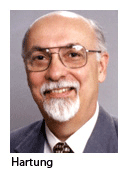With Dr. Bruce Hartung
The last two columns related to spiritual warfare elicited a number of different reflections on ways that readers have fought in this battle, as well as sugge stions they offer as encouragement for others. To read February’s “Pressure Points,” go to http://reporter.lcms.org/?19589, and to http://reporter.lcms.org/?19742 for the March column. Readers’ comments that follow are in italic type and my response to each is in regular type.
stions they offer as encouragement for others. To read February’s “Pressure Points,” go to http://reporter.lcms.org/?19589, and to http://reporter.lcms.org/?19742 for the March column. Readers’ comments that follow are in italic type and my response to each is in regular type.
Screwtape Letters by C.S. Lewis should be required reading to gain insight into spiritual warfare. It should be reread every few years, so you don’t forget the tempter’s powers. He knows your every weakness and is ready to take advantage.
Agreed!
What came to mind [in reading your column] is the usefulness of the examen process over time; i.e., at the end of each day, coming before God in the fullness of His love and inviting His light to shine on our day … for what was I most grateful? Least grateful? Where did I extend love? Where did I not? There are a variety of pairings for the questions, but when I journal about them daily, it doesn’t take long to see unhealthy patterns of thinking, feeling, doing that are at work and God provides the insight needed to truly repent and to live aware and responsibly as a Christ-follower. A very simple book that describes the process in the context of three people’s experiences is Sleeping with Bread: Holding What Gives You Life by Dennis Linn.
Two things are central in this reader’s response: 1) a time at the end of the day for reflection about the day in an organized and meditational way, and 2) a journaling process through which a person keeps a record of his or her reflections. The journal itself then promotes further reflection and, as the reader suggests, allows for the recognition of patterns and repetitive concerns and issues. Add to this a self-examination process and journaling meditation on a portion of Scripture, and I think you have a process with considerable power — Holy Spirit-driven to strengthen a person spiritually. I will take the reader’s word on the book reference, since I am not familiar with it.
I have prayed in the Lectio Divina process for a number of years. This involves reading a scriptural text, focusing on a particular word or cluster in the text, meditating on the text, prayer in response to the text, and silent resting as the meaning of the text really impacts you. Following this is the development of how all this moves into my daily life. This is the classic lectio, meditatio, oratio, contemplatio and, for some, operatio. Most important for me is that this is not so much reading the Scriptures to gain more factual knowledge about what is in them, but rather the use of the Scriptures in a way that forms and changes me.
This is a process dating back to the ancient church. Its focus is on a deeper reflection on the Scripture, with specific application to one’s personal formation. If our readers wish to consider this method, one reading to seek is Lectio Divina: Contemplative Awakening and Awareness by Christine Valters Paintner and Lucy Wynkoop (Paulist Press), for both theory and practical application. This is a venerable method of spiritual reflection, formation and support.
Having a spiritual director has been one of the more important things I have done to put on the “whole armor of God.” To have someone walk with me who actually asks me how I am doing spiritually has become a very important thing for me. I encourage everyone to consider doing this. Living in this world is often pretty hard for me. I need one-on-one conversations to help me walk through my life in a way that is, I pray, more consistent with God’s will for me. My pastor often is this person for me. He pays attention to the spiritual needs that I have and gives me opportunity to talk about my walk with Christ at my side.
You give me opportunity to reinforce the need for individual people to utilize others in the community of the followers of Christ. Gearing up for spiritual warfare is not just an individual process. It involves utilizing the whole community of the baptized.
The Rev. Bruce M. Hartung, Ph.D., is the associate dean of Ministerial Formation and director of the M.Div./Alternate Route programs at Concordia Seminary, St. Louis. He can be reached at hartungb@csl.edu.
Posted March 29, 2012



